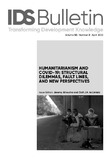| dc.contributor.author | Beaujouan, Juline | |
| dc.date.accessioned | 2022-04-12T16:30:48Z | |
| dc.date.available | 2022-04-12T16:30:48Z | |
| dc.date.issued | 2022-04-12 | |
| dc.identifier.citation | Beaujouan, J. (2022) ‘The Covid-19 Pandemic and Alternative Governance Systems in Idlib’ in Allouche, J. and te Lintelo, D.J.H. (Eds) Humanitarianism and Covid-19: Structural Dilemmas, Fault Lines, and New Perspectives, IDS Bulletin 53.2, Brighton: IDS | en |
| dc.identifier.uri | https://opendocs.ids.ac.uk/opendocs/handle/20.500.12413/17313 | |
| dc.description.abstract | As Covid-19 hit Syria after a decade of protracted conflict, the fragmentation of the territory and governance system prevented the adoption of a national strategy to mitigate the impact of the pandemic. In Idlib Governorate, the Covid-19 pandemic highlighted the inability of the Syrian Salvation government to offer an effective alternative to the Syrian regime. While it failed to provide health care and social services and to corner the international aid market, international aid routes were blocked by al-Assad’s regime in an attempt to squeeze the opposition further. In this context, local civil society in northwest Syria emerged as another non-state agent of governance. | en |
| dc.language.iso | en | en |
| dc.publisher | Institute of Development Studies | en |
| dc.relation.ispartofseries | IDS Bulletin;53.2 | |
| dc.rights.uri | https://www.ids.ac.uk/wp-content/uploads/2021/05/Latest_IDSOpenDocsStandardTermsOfUse_CC_BY.pdf | en |
| dc.title | The Covid-19 Pandemic and Alternative Governance Systems in Idlib | en |
| dc.type | Article | en |
| dc.rights.holder | Institute of Development Studies | en |
| dc.identifier.doi | 10.19088/1968-2022.116 | |
| rioxxterms.funder | Default funder | en |
| rioxxterms.identifier.project | Default project | en |
| rioxxterms.version | VoR | en |
| rioxxterms.versionofrecord | 10.19088/1968-2022.116 | en |
| rioxxterms.funder.project | 9ce4e4dc-26e9-4d78-96e9-15e4dcac0642 | en |

